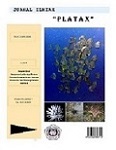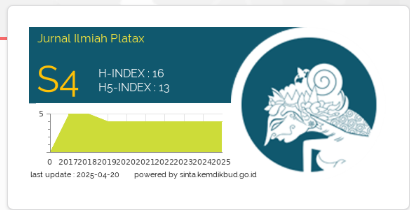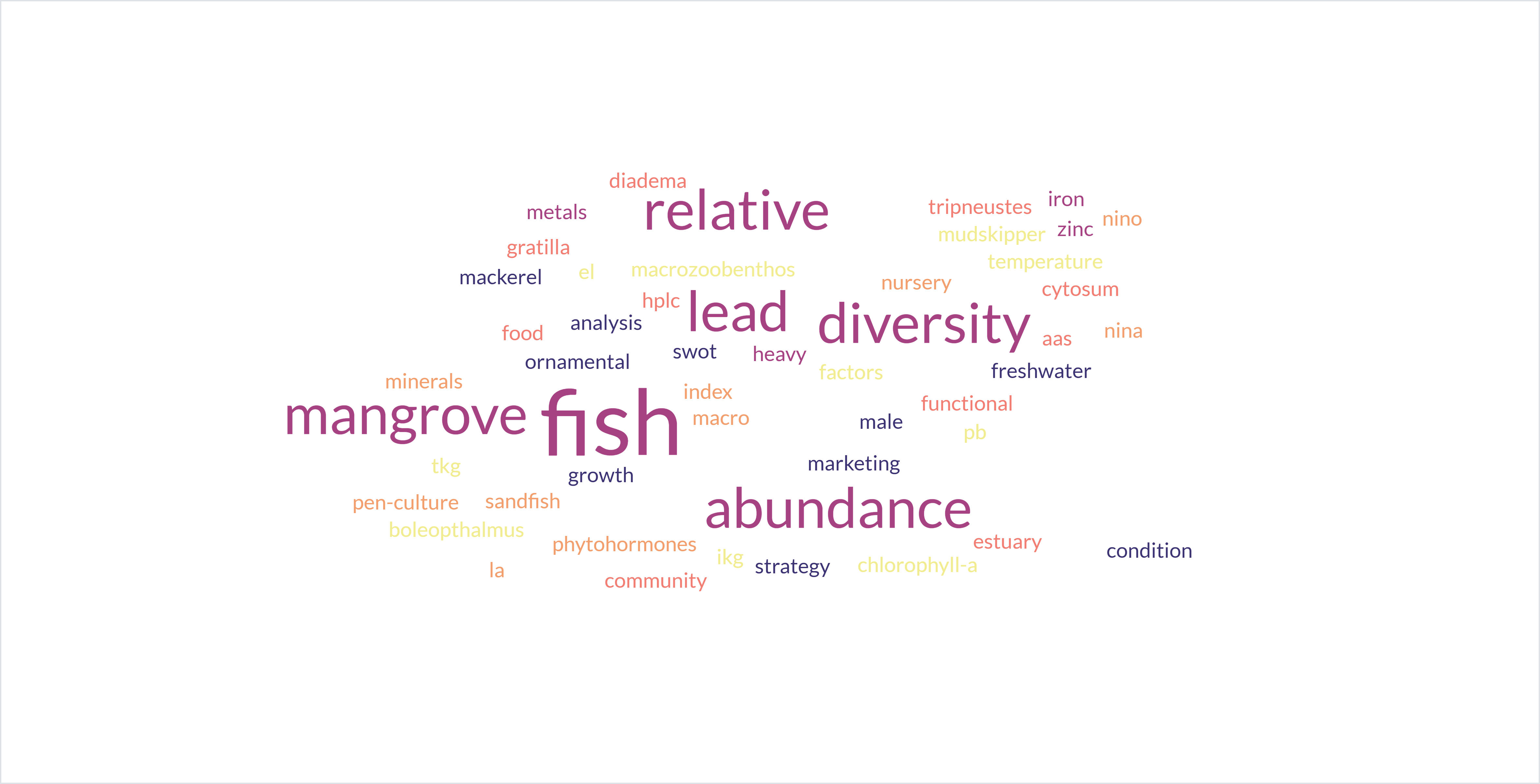Effects of Shochu Distillery By-products on the Energy Budget of Common Carp
DOI:
https://doi.org/10.35800/jip.v11i1.45008Abstract
The effects of Shochu distillery by-products (SDBP) were investigated by supplementary different level of SDBP to the basal diets for Japanese Common carp. To clarify the growth performances, energy budget equation was applied in this study. The feeding trial was conducted for 20 days by feeding the test diets containing SDBP at 0, 2,1 and 4.2%, respectively. Based on the energy budget equation, the digestible energy (DE) requirements for the maximum growth ranged from 49.0 – 55.8 kcal/ind/d. The 4.2% SDBP diet yielded 6.5% higher growth energy but 7.1% lesser metabolic energy than the control. The energy budget on 4.2% SDBP diet accounted for 10.6% of feces (2.42 kcal/ind/d), 4.2% of non-fecal (0.93 kcal/ind/d), 39.4% of metabolic loss (9.03 kcal/ind/d) and 45.9% of growth (10.5 kcal/ind/d), respectively. Correspond to the control, non-fecal and metabolic energies were lower, in 4.2% SDBP resulting in the higher product energy. The above results indicate that SDBP can be utilized as a supplement ingredient for the growth promotion of carp feed, since it could provide a superior property for growth energy of fish by reduced energy of metabolic loss and non-fecal losses.
Key words: Shochu distillery by-products; Energy requirements; Metabolic loss; Growth; Carp
References
AOAC. 1990. Official Methods of Analysis. Association of Official Analytical Chemists. Washington, DC. 1298 pp.
Baskar, K., Maheswaran, R., Jeyakumar, M., William, S. J., Fleming, A. T., Ambrose, T., & Vincent, S. 2011. Effects of different plant food on food utilization and energy budget in Cyprinus carpio ( Linnaeus ). Elixir Aquaculture. 35, 2901–2904.
Bevelhimer, M.S. 2002. A Bioenergetics model for white sturgeon Acipenser transmontanus: assessing differences in growth and reproduction among Snake River reaches. J. Applied Ichthy. 18, 550-556.
Bligh, E.G. and W.J. Dyer. 1959. A rapid method of total lipid extraction and purification. Canadian Journal of Biochemistry and Physiology. 37, 911-917.
Brett, J.R. and Zala, C.A. 1975. Daily pattern of nitrogen excretion and oxygen consumption of sockeye salmon (Oncorhynchus nerka) under controlled conditions. J. Fish. Res. Board Can. 32, 2479 – 2486.
Carter, C.G. and Hauler, R.C. 2000. Fish meal replacement by plant meals in extruded feeds for Atlantic salmon, Salmo salar L. Aquaculture, 185, 299-311.
Chakraborty, S.C., Ross, L.G. and Ross B. 1995. Energy budget and metabolism in common carp, Cyprinus carpio L., fed on different dietary protein levels and at different ration levels. Aquaculture Nutrition 1995 1; 179-187.
Chakraborty, S.C. Chowdhury, S.A. and Chakraborty, S. 1999. Energy Budget of Indian Major Carp, Labeo rohita Fingerlings Fed on Diets with Different Protein Levels. Asian Fisheries Science, 12: 297-308.
Elliott, J.M. and Davison, W. 1975. Energy equivalents of oxygen consumption in animal energetics. Oecologia 19, 195-201.
Hardy, R.W. 1995. Currents issues in salmonid nutrition. In: Lim C.E. and D.J. Sessa (eds) Nutrition and Utilization Technology in Aquaculture. AOCS Press, Champaign, USA. pp. 26-35.
Higgs, D.J., Dosanjh, B.S., Prendergast, A.F., Beames, R.M., Hardy, R.W., Riley, W. and Deacon, G. 1995. Use of rapeseed/canola protein products in finfish diet. In: C.E Lim and D.J. Sessa (eds) Nutrition and Utilization Technology in Aquaculture, AOCS Press, Champaigh, IL. pp. 130-156.
Horne, A.J. and Goldman, C.R. 1994. Limnology, 2nd ed. McGraw-Hill, New York.
Jobling, M. 1981. Some effects of temperature, feeding and body weight on nitrogen excretion in young plaice Pleuronectes platessa L. J. Fish Bio. 18, 87-96.
Kadowaki, S. 1994. Energy budget for a yellowtail, Seriola quingqueradiata in pen culture. Bulletin of National Research Institute Aquaculture, Supplement 1, 45-59.
Kaushik, S.J. 1980. Influence of nutritional status on the daily patterns of nitrogen excretion in the carp (Cyprinus carpio L.) and rainbow trout (Salmo gairdneri R.). Reproduction of Nutrition Development, 20, 1751-1976.
Kim, J.D., Kim, K.S., Jeong, K.S., Song, J.S., Lee, S.B., Woo, Y.B. and Lee J.Y. (1997): Effects of partial substitution of dietary fish protein concentrate or blood meal on growth and pollution loads of Israeli strain common carp (Cyprinus carpio). K. J. Animal and Feed 21, 237-244.
Kitchell, J.F., Stewart, D.J. and Weininger, D. 1977. Applications of a bioenergetics model to yellow perch (Perca flavescens) and walleye (Stizostedion vitreum). J. Fish. Res. Board Can. 34, 1922-1935.
Mahfudz, L.D., Hayashi, K., Ikeda, M., Hamada, K., Ohtsuka, A. and Tomita, Y. 1996. The effective use of shochu distillery by-products as a source of broiler feed. Japan. Poult. Sci. 33, 1-7.
Mahfudz, L.D., Nakashima, K., Ohtsuka, A. and Hayashi, K. 1997. Growth factors for a primary chick muscle cell culture from shochu distillery by-products. Biosci. Biotech.Biochem. 61, 1844-1847.
Mokolensang, J. F., Yamasaki, S. and Onoue, Y. 2003a. Utility of Shochu distillery by-products as a feedstuff for the carp Cyprinus carpio L. Suisanzoshoku, 51, 205-210.
Mokolensang, J. F., Yamasaki, S. and Onoue, Y. 2003b. Utilization of sweet potato distillery by-products as a feedstuff for the red carp Cyprinus carpio L. J. World Aqua. Soc. 34, 512-517.
NRC. 1993. Nutrients Requirements of Fish. National Academy Press. Washington, D.C. 114 pp.
Ohtsuka, A., Otsuji, Y. and Hayashi, K. 1998. Plasma α-tocopherol of broiler chicken is increased by shochu distillery by-product. Japan. Poult. Sci. 35, 132-137.
Ohta, M. and Watanabe, T. 1996. Energy requirements for maintenance of body weight and activity, and for maximum growth in rainbow trout. Fisheries Science 62, 731-736.
Pongmaneerat, J. and Watanabe, T. 1993. Nutritional evaluation of soybean meal for rainbow trout and carp. Japan Poult. Sci. 59, 157-163.
Robinson, E.H., and Li, M.H. 1995. Use of cottonseed meal in aquaculture feeds. In: Lim C.E. and D.J. Sessa (eds) Nutrition and Utilization Technology in Aquaculture. AOCS Press, Champaign, USA, pp. 157-165.
Rumsey, G.L. 1993. Fish meal and alternate sources of protein in fish feed. Fisheries, 18, 14-19.
Smith, R.R., Rumsey, G. L. and Scott, M. L. 1978. Net energy maintenance requirements of salmonids as measured by direct calorimetry: Effect of body size and environmental temperature. Journal of Nutrition 108, 1017-1024.
Strickland, J. D. H. and T. R. Parsons. 1972. A practical handbook of seawater analysis, In Stevenson, J.C. (Ed.), Bulletin 167, 2nd edition. Fisheries Research Board of Canada, Ottawa. p. 310.
Tacon, A.G. J and Jackson, A. 1985. Utilization of conventional and non-conventional protein sources in practical feeds. In: Cowey C. B., A. M. Mackie and J. G. Bell (eds) Nutrition and Feeding in Fish Academic Press, London, pp. 119-145.
Tacon, A.G. J. 1994. Feed ingredients for carnivorous fish species. Alternatives to fishmeal and other fishery resources. FAO Fisheries Circular No. 881. Food and Agriculture Organization of the United Nations, Rome, pp. 35.
Watanabe, T., Takeuchi, T., Satoh, S., Wang, K., Ida, T., Yaguchi, M., Nakada, M. Amano, T., Yoshijima, S. and Aoe, H. 1987. Development of practical carp diets for reduction of total nitrogen loading on the water environment. Nippon Suisan Gakkaishi, 53, 2217-2225.
Watanabe, T. and Ohta, M. 1995. Digestible and metabolizable energy of various diets for carp and rainbow trout. Fisheries Science 61, 215-222.
Watanabe, T., Verakunpiriya, V., Watanabe, K., Kiron, V. and Satoh, S. 1997. Feeding of rainbow trout with non-fish meal diets. Fisheries Science. 63, 258-266.
Webster, C.D., J.H. Tidwell, and L.S. Goodgame. 1993. Growth body composition and organoleptic evaluation of channel catfish fed diets containing different percentages of distiller’s grains with solubles. Progressive Fish-Culturist 55:95-100.
Downloads
Published
How to Cite
Issue
Section
License
Copyright (c) 2023 Jeffrie Fredrik Mokolensang, Lusia Manu, Gaspar D. Manu

This work is licensed under a Creative Commons Attribution-NonCommercial 4.0 International License.
COPYRIGHT
Authors who publish with this journal agree to the following terms:
Authors hold their copyright and grant this journal the privilege of first publication, with the work simultaneously licensed under a Creative Commons Attribution License that permits others to impart the work with an acknowledgment of the work's origin and initial publication by this journal.
Authors can enter into separate or additional contractual arrangements for the non-exclusive distribution of the journal's published version of the work (for example, post it to an institutional repository or publish it in a book), with an acknowledgment of its underlying publication in this journal.
Authors are permitted and encouraged to post their work online (for example, in institutional repositories or on their website) as it can lead to productive exchanges, as well as earlier and greater citation of the published work (See The Effect of Open Access).






































